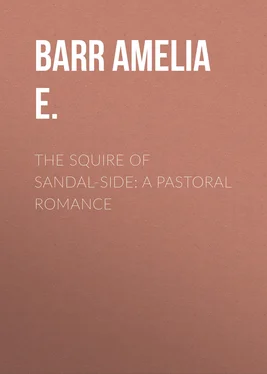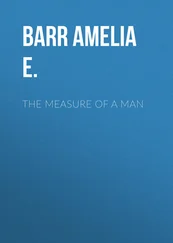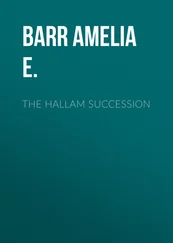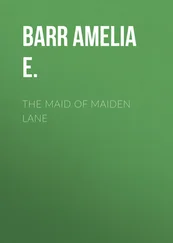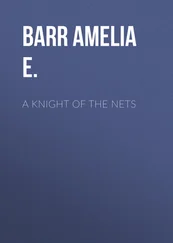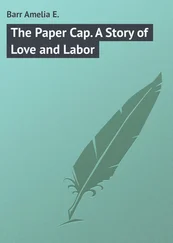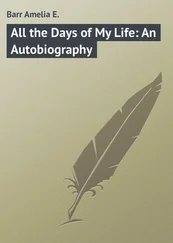Amelia Barr - The Squire of Sandal-Side - A Pastoral Romance
Здесь есть возможность читать онлайн «Amelia Barr - The Squire of Sandal-Side - A Pastoral Romance» — ознакомительный отрывок электронной книги совершенно бесплатно, а после прочтения отрывка купить полную версию. В некоторых случаях можно слушать аудио, скачать через торрент в формате fb2 и присутствует краткое содержание. Жанр: foreign_prose, foreign_antique, на английском языке. Описание произведения, (предисловие) а так же отзывы посетителей доступны на портале библиотеки ЛибКат.
- Название:The Squire of Sandal-Side: A Pastoral Romance
- Автор:
- Жанр:
- Год:неизвестен
- ISBN:нет данных
- Рейтинг книги:3 / 5. Голосов: 1
-
Избранное:Добавить в избранное
- Отзывы:
-
Ваша оценка:
- 60
- 1
- 2
- 3
- 4
- 5
The Squire of Sandal-Side: A Pastoral Romance: краткое содержание, описание и аннотация
Предлагаем к чтению аннотацию, описание, краткое содержание или предисловие (зависит от того, что написал сам автор книги «The Squire of Sandal-Side: A Pastoral Romance»). Если вы не нашли необходимую информацию о книге — напишите в комментариях, мы постараемся отыскать её.
The Squire of Sandal-Side: A Pastoral Romance — читать онлайн ознакомительный отрывок
Ниже представлен текст книги, разбитый по страницам. Система сохранения места последней прочитанной страницы, позволяет с удобством читать онлайн бесплатно книгу «The Squire of Sandal-Side: A Pastoral Romance», без необходимости каждый раз заново искать на чём Вы остановились. Поставьте закладку, и сможете в любой момент перейти на страницу, на которой закончили чтение.
Интервал:
Закладка:
"Come in, Charlotte."
"How did you know it was I?"
"I know your knock, however you vary it. Nobody knocks like you. I suppose no two people would make three taps just the same." She was far too polite to yawn; but she made as much of the movement as she could not control, and then put a mark in her book, and laid it down. A very different girl, indeed, was she from her younger sister; a stranger would never have suspected her of the same parentage.
She had dark, fine eyes, which, however, did not express what she felt: they rather gave the idea of storing up impressions to be re-acted upon by some interior power. She had a delicate complexion, a great deal of soft, black hair compactly dressed, and a neat figure. Her disposition was dreamy and self-willed; occult studies fascinated her, and she was passionately fond of moonlight. She was simply dressed in a white muslin frock, with a black ribbon around her slim waist; but the ribbon was clasped by a buckle of heavily chased gold, and her fingers had many rings on them, and looked—a very rare circumstance—the better for them. Having put down her book, she rose from her chair; and as she dipped the tips of her hands in water, and wiped them with elaborate nicety, she talked to Charlotte in a soft, deliberate way.
"Where have you been, you and father, ever since daybreak?"
"Up to Blaeberry Tarn, and then home by Holler Beck. We caught a creel full of trout, and had a very happy day."
"Really, you know?"
"Yes, really; why not?"
"I cannot understand it, Charlotte. I suppose we never were sisters before." She said the words with the air of one who rather states a fact than asks a question; and Charlotte, not at all comprehending, looked at her curiously and interrogatively.
"I mean that our relationship in this life does not touch our anterior lives."
"Oh, you know you are talking nonsense, Sophia! It gives me such a feel, you can't tell, to think of having lived before; and I don't believe it. There, now! Come, dear, let us go to dinner; I'm that hungry I'm fit to drop." For Charlotte was watching, with a feeling of injury, Sophia's leisurely method of putting every book and chair and hairpin in its place.
The sisters' rooms were precisely alike in their general features, and yet there was as great a relative difference in their apartments as in their natures. Both were large, low rooms, facing the sunrise. The walls of both were of dark oak; the roofs of both were of the same sombre wood; so also were the floors. They were literally oak chambers. And in both rooms the draperies of the beds, chairs, and windows were of white dimity. But in Sophia's, there were many pictures, souvenirs of girlhood's friendships, needlework, finished and unfinished drawings, and a great number of books mostly on subjects not usually attractive to young women. Charlotte's room had no pictures on its walls, and no odds and ends of memorials; and as sewing was to her a duty and not a pleasure, there was no crotcheting or Berlin-wool work in hand; and with the exception of a handsome copy of "Izaak Walton," there were no books on her table but a Bible, Book of Common Prayer, and a very shabby Thomas à Kempis.
So dissimilar were the girls in their appearance and their tastes; and yet they loved each other with that calm, habitual, family affection, which, undemonstrative as it is, stands the wear and tug of life with a wonderful tenacity. Down the broad, oak stairway they sauntered together; Charlotte's tall, erect figure, bright, loose hair, pink dress, and flowing ribbons, throwing into effective contrast the dark hair, dark eyes, white drapery, and gleaming ornaments of her elder sister.
In the hall they met the squire. He was very fond and very proud of his daughters; and he gave his right arm to Sophia, and slipped his left hand into Charlotte's hand with an affectionate pride and confidence that was charming.
"Any news, mother?" he asked, as he lifted one of the crisp brown trout from its bed of white damask and curly green parsley.
"None, squire; only the sheep-shearing at the Up-Hill Farm to-morrow. John of Middle Barra called with the statesman's respects. Will you go, squire?"
"Certainly. My men are all to lend a hand. Barf Latrigg is ageing fast now; he was my father's crony; if I slighted him, I should feel as if father knew about it. Which of you will go with me? Thou, mother?"
"That, I cannot, squire. The servant lasses are all promised for the fleece-folding; and it's a poor house that won't keep one woman busy in it."
"Sophia and Charlotte will go then?"
"Excuse me, father," answered Sophia languidly. "I shall have a headache to-morrow, I fear; I have been nervous and poorly all the afternoon."
"Why, Sophia, I didn't think I had such a foolish lass! Taking fancies for she doesn't know what. If you plan for to-morrow, plan a bit of pleasure with it; that's a long way better than expecting a headache. Charlotte will go then. Eh? What?"
"Yes, father; I will go. Sophia never could bear walking in the heat. I like it; and I think there are few things merrier than a sheep-shearing."
"So poetic! So idyllic!" murmured Sophia, with mild sarcasm.
"Many people think so, Sophia. Mr. Wordsworth would remember Pan and Arcadian shepherds playing on reedy pipes, and Chaldæan shepherds studying the stars, and those on Judæa's hills who heard the angels singing. He would think of wild Tartar shepherds, and handsome Spanish and Italian."
"And still handsomer Cumberland ones." And Sophia, having given this little sisterly reminder, added calmly, "I met Mr. Wordsworth to-day, father. He had come over the fells with a party, and he looked very much bored with his company."
"I shouldn't wonder if he were. He likes his own company best. He is a great man now, but I remember well when people thought he was just a little off-at-side. You knew Nancy Butterworth, mother?"
"Certainly I did, squire. She lived near Rydal."
"Yes. Nancy wasn't very bright herself. A stranger once asked her what Mr. Wordsworth was like; and she said, 'He's canny enough at times. Mostly he's wandering up and down t' hills, talking his po-et-ry; but now and then he'll say, "How do ye do, Nancy?" as sensible as you or me.'"
"Mr. Wordsworth speaks foolishness to a great many people besides Nancy Butterworth," said Sophia warmly; "but he is a great poet and a great seer to those who can understand him."
"Well, well, Mr. Wordsworth is neither here nor there in our affairs. We'll go up to Latriggs in the afternoon, Charlotte. I'll be ready at two o'clock."
"And I, also, father." Her face was flushed and thoughtful, and she had become suddenly quiet. The squire glanced at her, but without curiosity; he only thought, "What a pity she is a lass! I wish Harry had her good sense and her good heart; I do that."
CHAPTER II.
THE SHEEP-SHEARING
"Plain living and high thinking …
The homely beauty of the good old cause,
…our peace, our fearful innocence,
And pure religion breathing household laws."
"A happy youth, and their old age
Is beautiful and free."
The sheep-shearings at Up-Hill Farm were a kind of rural Olympics. Shepherds came there from far and near to try their skill against each other,—young men in their prime mostly, with brown, ruddy faces, and eyes of that bright blue lustre which is only gained by a free, open-air life. The hillside was just turning purple with heather bloom, and along the winding, stony road the yellow asphodels were dancing in the wind. Everywhere there was the scent of bog-myrtle and wild-rose and sweetbrier, and the tinkling sound of becks babbling over glossy rocks; and in the glorious sunshine and luminous air, the mountains appeared to expand and elevate, and to throw out glowing peaks and summits into infinite space.
Читать дальшеИнтервал:
Закладка:
Похожие книги на «The Squire of Sandal-Side: A Pastoral Romance»
Представляем Вашему вниманию похожие книги на «The Squire of Sandal-Side: A Pastoral Romance» списком для выбора. Мы отобрали схожую по названию и смыслу литературу в надежде предоставить читателям больше вариантов отыскать новые, интересные, ещё непрочитанные произведения.
Обсуждение, отзывы о книге «The Squire of Sandal-Side: A Pastoral Romance» и просто собственные мнения читателей. Оставьте ваши комментарии, напишите, что Вы думаете о произведении, его смысле или главных героях. Укажите что конкретно понравилось, а что нет, и почему Вы так считаете.
